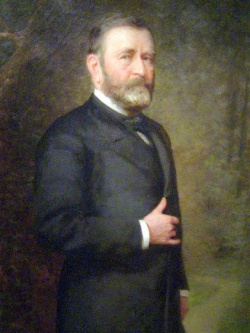Thomas Le Clear: Difference between revisions
No edit summary |
No edit summary |
||
| Line 4: | Line 4: | ||
== Personal life == | == Personal life == | ||
Thomas Le Clear was born in Oswego, New York, on March 17, 1818. | Thomas Le Clear was born in Oswego, New York, on [[March 17]], 1818. | ||
He died in Rutherford Park, New Jersey, on [[November 26]], 1882. | He died in Rutherford Park, New Jersey, on [[November 26]], 1882. | ||
== Artistic career == | == Artistic career == | ||
According to the American Cyclopedia, | |||
<blockquote> | |||
He began to follow art professionally before he had had any instruction, and his later advantages in that direction were confined to simple observation of the works of other artists. He went to London, Canada, with his father in 1832, and after painting portraits for a time there, and in Elmira and Rochester, he made his way to New York city and opened a studio in 1839. In 1844-60 he resided in Buffalo, but afterward returned to New York [City]. In 1863 he was elected a National academician. Among his compositions are “The Reprimand ”; “ Marble-Players ”; and “ Itinerants ” (1862). Of his numerous portraits, one of the best is that of George Bancroft, at the Century club, New York; other excellent portraits are those of William Cullen Bryant, Bayard Taylor, President Fillmore, and Edwin Booth as Hamlet.<ref>"Le Clear, Thomas" Americans' Cyclopediaof American Biography, 1600-1889, 651. Accessed on Ancestry.com.</ref> | |||
</blockquote> | |||
Around 1880, Le Clear was commissioned to paint the portrait of '''Ulysses S. Grant''' shortly after the former president returned from a world tour. Two versions were painted. One was originally owned by Grant personally, and now hangs in the National Portrait Gallery of the Smithsonian Institution. The other is in the White House collection.<ref>"Ulysses S. Grant" in [https://artsandculture.google.com/asset/ulysses-s-grant/7wGKGU0QxmJrnA Google Arts and Culture website].</ref> | |||
== Theosophical Society connection == | == Theosophical Society connection == | ||
Revision as of 21:10, 14 September 2018
Thomas Le Clear (1818-1882) was a prominent American painter known to Theosophists for his oil portrait of Helena Petrovna Blavatsky. NOTE: no photograph of the HPB portrait is available.
Personal life
Thomas Le Clear was born in Oswego, New York, on March 17, 1818.
He died in Rutherford Park, New Jersey, on November 26, 1882.
Artistic career
According to the American Cyclopedia,
He began to follow art professionally before he had had any instruction, and his later advantages in that direction were confined to simple observation of the works of other artists. He went to London, Canada, with his father in 1832, and after painting portraits for a time there, and in Elmira and Rochester, he made his way to New York city and opened a studio in 1839. In 1844-60 he resided in Buffalo, but afterward returned to New York [City]. In 1863 he was elected a National academician. Among his compositions are “The Reprimand ”; “ Marble-Players ”; and “ Itinerants ” (1862). Of his numerous portraits, one of the best is that of George Bancroft, at the Century club, New York; other excellent portraits are those of William Cullen Bryant, Bayard Taylor, President Fillmore, and Edwin Booth as Hamlet.[1]
Around 1880, Le Clear was commissioned to paint the portrait of Ulysses S. Grant shortly after the former president returned from a world tour. Two versions were painted. One was originally owned by Grant personally, and now hangs in the National Portrait Gallery of the Smithsonian Institution. The other is in the White House collection.[2]
Theosophical Society connection
Mr. Le Clear was acquainted with Madame Blavatsky and Colonel Olcott in New York City. After Blavatsky created her "Portrait of the Yogi Tiravalla" phenomenally, Olcott wrote, "Le Clear, the Noted American portrait painter, declared it unique, distinctly an 'individual' in the technical sense; one that no living artist within his knowledge could have produced."[3] An article published in The Bombay Gazette reiterated:
Thomas LeClear, an eminent American painter, and William R. O’Donovan, an equally distinguished sculptor, affirmed in a London journal, that no living artist could, in their opinion, equal it in vigour, breadth, and uniqueness, while they were both unable to decide upon the nature of the colouring substance employed in the manner of its application.[4]
Portrait of Madame Blavatsky
Additional resources
- "Thomas Le Clear (1818 – 1882)" at American Gallery website. Examples of his work.
Notes
- ↑ "Le Clear, Thomas" Americans' Cyclopediaof American Biography, 1600-1889, 651. Accessed on Ancestry.com.
- ↑ "Ulysses S. Grant" in Google Arts and Culture website.
- ↑ Henry Steel Olcott, Old Diary Leaves First Series (Adyar, Madras: The Theosophical Publishing House, 1974), 367-368.
- ↑ See "Theosophic Thaumaturgy--A Startling Story" at The Blavatsky Archives. Reprinted from The Bombay Gazette (March 31st, 1879), p.3.
